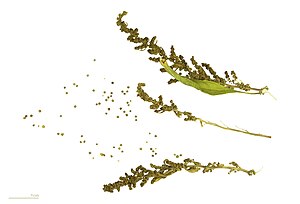Note: This is a project under development. The articles on this wiki are just being initiated and broadly incomplete. You can Help creating new pages.
Dysphania ambrosioides - Epazote
Revision as of 08:51, 23 April 2018 by Prabhakar (talk | contribs) (Prabhakar moved page Epazote (Dysphania ambrosioides) to Dysphania ambrosioides - Epazote)
Epazote, formerly Chenopodium ambrosioides, known as wormseed, Jesuit's tea, Mexican-tea, payqu (paico), Dysphania ambrosioides, or herba sancti Mariæ, is an annual or short-lived perennial herb native to Central America, South America, and southern Mexico.
Contents
Description
D. ambrosioides is an annual or short-lived perennial plant (herb), growing to 1.2 m (3.9 ft) tall, irregularly branched, with oblong-lanceolate leaves up to 12 cm (4.7 in) long. The flowers are small and green, produced in a branched panicle at the apex of the stem.
Uses
- D. ambrosioides is used as a leaf vegetable, herb, and herbal tea for its pungent flavor.
- It is often used as an herb in white fried rice and an important ingredient for making the green salsa for chilaquiles.
- D. ambrosioides was used as an anthelmintic to treat ascarids and hookworms in humans, cats, dogs, horses, and pigs.[clarification needed]
- Chenopodium is still used to treat worm infections in humans in many countries.
- In a few areas in Latin America, the plant also is used to treat worm infections in livestock.
- D. ambrosioides is believed to prevent flatulence. It has also been used for amenorrhea, dysmenorrhea, malaria, chorea, the now discredited diagnosis of hysteria, catarrh, and asthma.[clarification needed]
Common name
- English - Epazote
- Hindi - सुगंध वस्तूका
- Kannada - ಕಡವೊಮ
